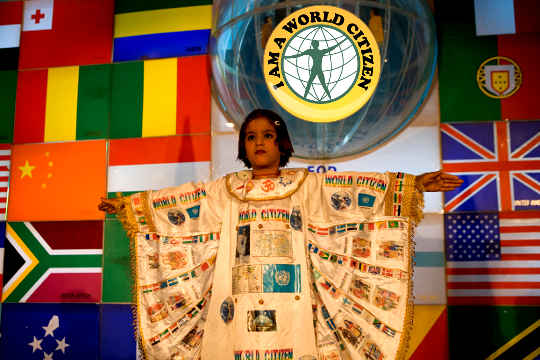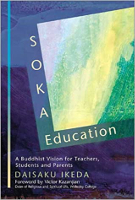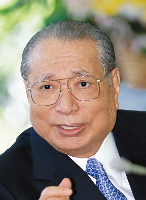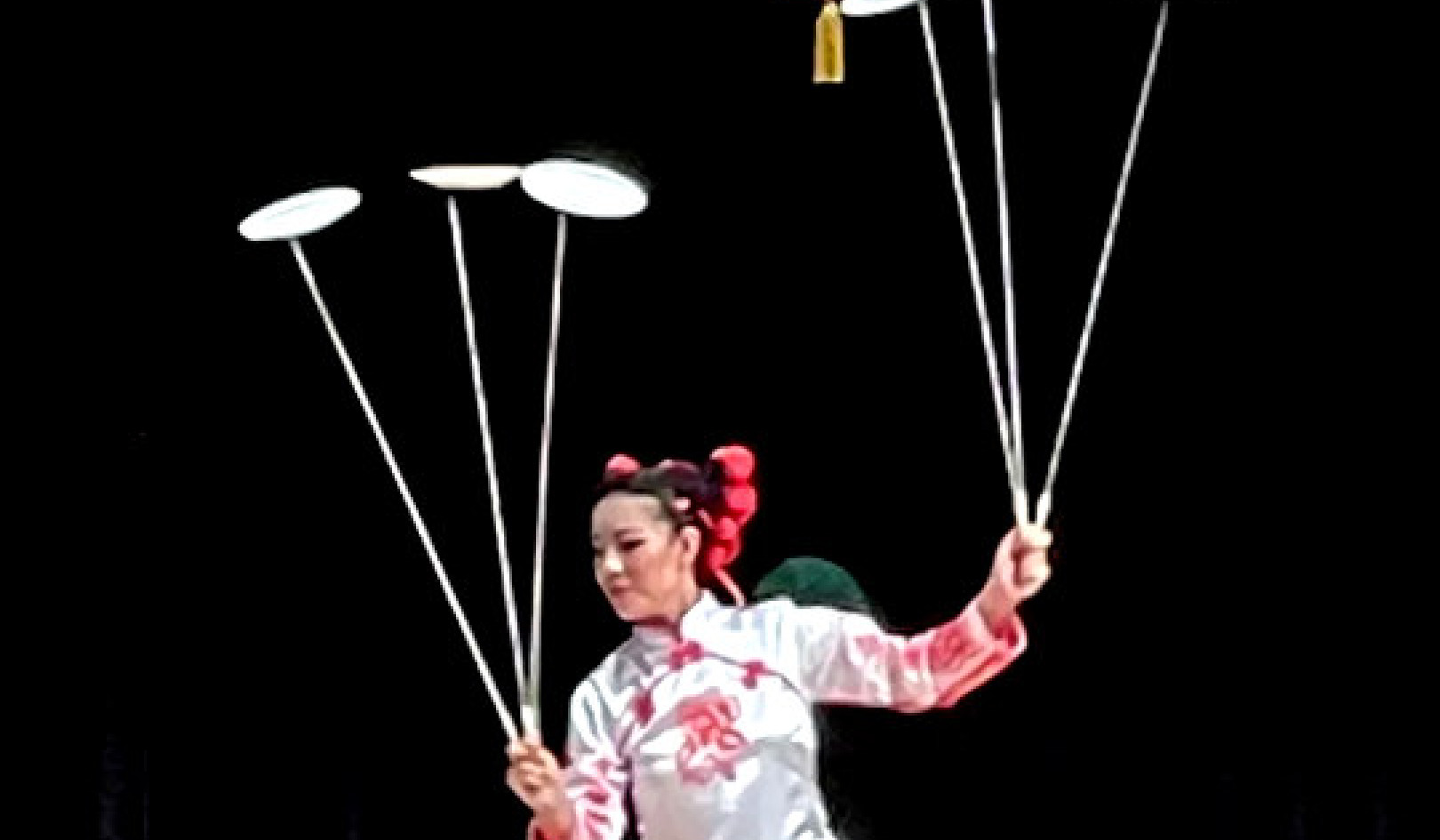 City Montessori School popularized the concept of 'World Citizen's Dress' which was first developed by Professor Mangesh Teli of Bombay University. Embossed on the World Citizen's Dress are the symbols of all major religions and the national flags of all countries. (CC 3.0)
City Montessori School popularized the concept of 'World Citizen's Dress' which was first developed by Professor Mangesh Teli of Bombay University. Embossed on the World Citizen's Dress are the symbols of all major religions and the national flags of all countries. (CC 3.0)
Our youth, to whom we will entrust the twenty-first century, look upon neither their future nor their world with bright hope. This is why I feel compelled to discuss the problems of our youth, particularly in the advanced industrialized nations. It is essential that we consider the problems of youth in the wider context of family life.
It is said that children are the mirror of society; young people are quicker than older generations to perceive and respond to the trends of the times. The collapse of socialism in the former Soviet Union and Eastern Europe is significant in this sense. It is no exaggeration to say that, between the Russian Revolution and the fall of the Soviet Union, a period spanning more than half of the twentieth century, socialism virtually monopolized the position as the most ideal system in humankind's history.
Although different countries conceived of it in different ways depending on their developmental stage and geographical location, the socialism of the so-called Red Thirties represented the goal of historical progress and development, and it provided lasting spiritual support to all people who would not tolerate evil and injustice. It was especially appealing to the young, whose hearts burned with idealism.
At long last, however, this tendency began to fade in the last quarter of the century, and the final blow came with the sudden collapse of socialist regimes in the former Soviet Union and Eastern Europe in the late 1980s. The young activists of the past, with their outpouring of youthful energy, their indomitable and devoted spirit proudly expressed in the full-voiced singing of "L'Internationale," their eyes alight with idealism, have virtually disappeared from the main stage of world history.
With the realization that, far from being a utopia at the end of the rainbow, their promised land was in fact a wasteland filled with oppression and servitude, the world's youth have been drawn into a whirlpool of confused values. In a way, it is only natural they have fallen under the spell of Mammon and have come to look upon material wealth as the only thing they can trust.
A Desolation is Emerging
The ostensible "victors" in the Cold War, the countries of the Free World, have not escaped this phenomenon. There, in every corner of society, a desolation is emerging that does not seem in keeping with the glory of victory. The misconduct of youth and the rise of crime are expressions of an underlying malaise.
Although there is no end to the list of people who lament our future and sound the alarm, Boston University President John Silber makes an insightful observation when he says, "The greatest threat lies within our own borders and within each of us." He elaborates as follows:
"We bear the unmistakable traces of self-indulgence. The habits developed through years of ease and plenty have left us, if not at our worst, very far from our best. We seem incapable of making those decisions that, though imperative for our own well-being and that of our children, require unwelcome self-restraint and self-denial. This failure in self-mastery is apparent not only in individual lives but in every aspect of our society. Through self-indulgence and seductive advertising we have turned our luxuries, even our whims, into needs."
There is perhaps nothing new about Dr. Silber's assertions. They were taken from a book that happened to be close at hand and reflect what might be considered common knowledge. The same sentiments can be found in this classic utterance of Rousseau: "Do you know the surest way to make your child miserable? Let him have everything he wants. . . " As this implies, people in all ages have recognized that the curbing of selfish impulses is the first step in developing good habits, and that freedom without self-restraint leads to self-indulgence, unhappiness, confusion and, in extreme cases, tyranny.
The most serious problem we face is the difficulty of instilling this common knowledge, this reasoning, in the hearts of our youth. Dr. Silber contends that the rising dissatisfaction with hedonism and materialism currently spreading among the American people represents a hopeful sign of sweeping change. While I have great respect for his optimistic conclusion, I do not believe things are really that simple.
I say this because what is really being questioned here is the very principle that has served as the driving force for modern civilization.
The Single-Minded Pursuit of Pleasure
As we all know, modern industrial civilization places priority on convenience and efficiency as the primary standards of progress and development, and in this context it is difficult to avoid, or indeed resist, the single-minded pursuit of pleasure, which has become the supreme value. Therefore, the materialism, hedonism and mammonism that have clouded the end of this past century are almost the inevitable consequences of modern civilization, which has neglected to rein in human desire.
In addition, overwhelming waves of urbanization and information networks generated by technological advancement in industrialized society have enveloped homes, schools and local communities that once provided important educational forums for our youth. In the past, these were the places children were taught discipline, a function severely limited today.
Under these circumstances it is extremely difficult to preach the time-honored virtues of modesty and frugality; in fact, if handled poorly, any attempt to do so can become the stuff of parody, as those in the (broadly defined) teaching profession understand better than anyone.
It is not enough to simply decry "negative" aspects of modern civilization such as materialism, hedonism, and mammonism. We must also show our youth new standards and values that can take the place of the negative ones and provide them with models to help them become what they need to be: people in control of their own desires and deportment. If the self-restraint and self-control we profess are not based on true conviction, our efforts will not be persuasive, nor can we instill an ethos of world citizenship in the younger generation.
Socrates, the "Teacher of Humankind"
In antiquity, one man placed himself right in the middle of the chaos of his times and resolutely attempted the task of instilling just such an ethos: that great and immortal educator of youth, the "Teacher of Humankind," Socrates. He lived in a time when the democratic government of Athens was in decline, and undoubtedly the confusion of values typical of such an era cast a dark shadow over young hearts. The dialogues of Plato provide ample evidence of this.
It was the Sophists -- philosophers like Protagoras, Gorgias, Prodicus and Hippias -- who controlled the education of the lost young souls buffeted by the currents of their times with no protective harbor; and with that control, they maintained both their wealth and reputations as they pleased.
A typical example of their educational technique can be found in Xenophon's "Memorabilia," where Gorgias speaks about the "Trials of Heracles." When Heracles was on the verge of manhood, he came upon a fork in the road and did not know which to take, at which point two women appeared before him. "The one was fair to see and of high bearing; her limbs were adorned with purity, her eyes with modesty; sober was her figure, and her robe was white. The other was plump and soft, with high feeding. Her face was made up to heighten its natural white and pink, her figure to exaggerate her height." Of course, the former lady was there to lead Heracles toward virtue, and the latter to entice him toward vice.
I will omit what the advocate of evil said, because it is identical to Rousseau's "surest way to make a child miserable:" Here are the words of the advocate of virtue:
"But I will not deceive you by a pleasant prelude: I will rather tell you truly the things that are, as the gods have ordained them. For of all things good and fair, the gods give nothing to man without toil and effort. If you want the favour of the gods, you must worship the gods: if you desire the love of friends, you must do good to your friends: if you covet honour from a city, you must aid that city: if you fain to win the admiration of all Hellas for virtue, you must strive to do good to Hellas: if you want land to yield you fruits in abundance, you must cultivate that land."
This goes further than Rousseau; in fact, it is a classic pattern for youth education that also underlies Confucian morality and represents a common sense, sound doctrine with which anyone can agree. The loss of awareness that "nothing good and fair" can be won "without toil and effort" is exactly what Dr. Silber so deeply laments in his book. (Straight Shooting: What's Wrong with America and How to Fix It.)
A Code of Ethics
Our problem lies in the fact that present social conditions are far beyond the stage at which we can simply preach this sound doctrine as is and expect it to be accepted. In other words, it is not just a simple matter, for example, of increasing the time spent on moral instruction in our schools. That is not enough. An extremely interesting article on Japanese morality by Professor Masahiko Fujiwara of Ochanomizu Women's University addresses this point. Based on his own experience, Professor Fujiwara focuses on the Japanese "way of the warrior" (Bushido), a code of ethics that has been compared with the English concepts of chivalry and gentlemanly behavior. He strongly felt the need to reassess Bushido as a means of recovering the Japanese ethos that once fascinated the people of the West.
When he had his first-year students read Inazo Nitobe's famous work, Bushido, however, he found that they rejected it in far stronger terms than he had anticipated. He writes:
"For these students, who were steeped in Western individualism, the virtues of loyalty to one's country, filial piety and obligation to the family were nothing more than a joke; in today's materially oriented social climate, the concepts of honor and shame have only secondary importance. Some students even grew indignant at the idea of valuing honor above life, calling the whole notion nonsense."
Given these dominant social norms, it is frighteningly difficult to convince our youth that nothing of value can be obtained "without toil and effort." Not only that, but the adults who espouse such classical moral values are themselves thoroughly immersed in modern civilization, with its emphasis on convenience, efficiency and pleasure. Under the circumstances, we cannot expect young people to accept traditional values as they are. Failing to realize this, any attempt to preach from a position of impertinent moral superiority will only invite apathy and rejection from our youth.
Citizen of the World
I believe this is the ironclad principle -- indeed, the imperishable "golden rule" of human education and moral upbringing: that the fervent involvement of the teacher is precisely what gets the students involved. In this there is no trace of contemptuousness in the teacher's attitude toward those who are learning; rather the relationship is maintained on a thoroughly equal and fair basis. Reverberating from such a relationship is the resonance of individual personalities associating and interacting in earnest and in harmony as complete human beings. The form of trust created in this way is precisely what has been called "virtue" since antiquity.
It seems to me that this is where we must seek the underlying, fundamental cause for the rising misbehavior, crime and other problems we observe among, modern youth: the lack of fully human interaction between individuals. We cannot expect our various treatments for the symptoms of this "disease" to work effectively at least until we clearly address this underlying need.
In his Essays, Montaigne wrote: "Someone asked Socrates of what country he was. He did not answer, 'Of Athens,' but 'Of the world.' He, whose imagination was fuller and wider, embraced the whole world as his city, and extended his acquaintance."
As it was with Socrates, so it shall be for us: by defining ourselves as citizens of the world, we can revitalize the now almost faded virtues of courage, self-control, devotion, justice, love and friendship, and make them vibrantly pulse in people's hearts. That is why, in my comments for the 1991 SGI Day (January 26), I observed:
"If a religion is worthy of the name, and if it is one that can respond to the needs of contemporary times, it should be able to nurture in its followers the spiritual base for becoming good citizens of the world."
I went on to suggest that, rather than attempt unprincipled compromise or collusion among different religions, we should instead encourage them to compete in the task of producing world citizens.
Reprinted with permission of the publisher,
Middleway Press. ©2001.
http://www.middlewaypress.com
Article Source
Soka Education: A Buddhist Vision for Teachers, Students & Parents
by Daisaku Ikeda
 From a Japanese word meaning “to create value,” this book presents a fresh spiritual perspective to question the ultimate purpose of education. Mixing American pragmatism with Buddhist philosophy, the goal of Soka education is the lifelong happiness of the learner. Rather than offering practical classroom techniques, this book speaks to the emotional heart of both the teacher and student. With input from philosophers and activists from several cultures, it advances the conviction that the true purpose of education is to create a peaceful world and to develop the individual character of each student in order to achieve that goal.
From a Japanese word meaning “to create value,” this book presents a fresh spiritual perspective to question the ultimate purpose of education. Mixing American pragmatism with Buddhist philosophy, the goal of Soka education is the lifelong happiness of the learner. Rather than offering practical classroom techniques, this book speaks to the emotional heart of both the teacher and student. With input from philosophers and activists from several cultures, it advances the conviction that the true purpose of education is to create a peaceful world and to develop the individual character of each student in order to achieve that goal.
Info/Order this book. Also available as a Kindle edition.
About the Author
 Daisaku Ikeda is president of the Soka Gakkai International, one of the most important international Buddhist communities in the world today. In 1968, he founded the first of many nonsectarian schools -- kindergartens, elementary, middle and high schools as well as Soka University in Japan -- based on the mission to nurture the lifelong happiness of the learner. In May 2001, Soka University of America, a four-year liberal arts college, opened its doors in Aliso Viejo, California. In his role as a peace activist, Mr. Ikeda has traveled to more than 50 countries, conducting dialogues with political and intellectual leaders and applying his strong belief that international understanding and the realization of peace begins with the heart-to-heart dialogue that is the hallmark of Soka education. He received the United Nations Peace Award in 1983. He is the author of numerous books, which have been translated into dozens of languages, including The Way of Youth, For the Sake of Peace and One by One: The World is Yours to Change.
Daisaku Ikeda is president of the Soka Gakkai International, one of the most important international Buddhist communities in the world today. In 1968, he founded the first of many nonsectarian schools -- kindergartens, elementary, middle and high schools as well as Soka University in Japan -- based on the mission to nurture the lifelong happiness of the learner. In May 2001, Soka University of America, a four-year liberal arts college, opened its doors in Aliso Viejo, California. In his role as a peace activist, Mr. Ikeda has traveled to more than 50 countries, conducting dialogues with political and intellectual leaders and applying his strong belief that international understanding and the realization of peace begins with the heart-to-heart dialogue that is the hallmark of Soka education. He received the United Nations Peace Award in 1983. He is the author of numerous books, which have been translated into dozens of languages, including The Way of Youth, For the Sake of Peace and One by One: The World is Yours to Change.



























